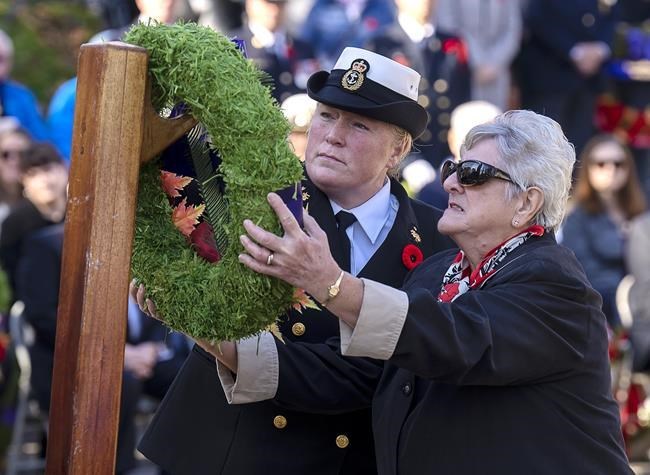HALIFAX — Thousands of people honoured the country's war dead during Remembrance Day ceremonies held on Friday in towns and cities across Atlantic Canada.
A large crowd gathered in warm sunshine on the Grand Parade in front of Halifax City Hall where military formations stood at attention in front of the cenotaph. The mournful sounds of the Last Post bugle call sounded out amid the firing of an artillery gun salute from nearby Citadel Hill.
Nova Scotia Lt.-Gov. Arthur LeBlanc was among the dignitaries in attendance, as were Charlotte and Lloyd Smith, parents of Pte. Nathan Smith, who was an infantryman with the Princess Patricia’s Canadian Light Infantry. Smith was among the first Canadian soldiers to die in the Afghanistan war, on April 17, 2002, and his parents are recipients of the Memorial Cross of Canada.
“I have so many people say to me at times, 'how do you ever get over it?'” Lloyd Smith said following the ceremony. “The truth is, you don’t; you never get over it. I still break down 22 years later.”
Smith said he was shocked when his son joined the military, but he added that Nathan quickly excelled during training and grew to love his job as a soldier. “It was something he really wanted to do … he did a good job and I’m proud of him."
Smith said he was impressed by the number of people who turned out to remember the men and women who served their country.
“It’s great to see the crowd,” he said. “It gives us a great feeling, and we are very appreciative of the people who do take the time to come out.”
One of the people who attended was 17-year-old Abby Titus, a Grade 12 student from Halifax who said the importance of Remembrance Day is not lost on young people. The effects of war are still being felt, she said, because of ongoing world conflicts.
“It’s been almost 100 years since World War Two and over 100 years since World War One, and (war) is still affecting us as a country and as a world,” Titus said. “It might be our history, but we are very much living it today.”
Gun salutes could be heard splitting the air in many other communities, including in Fredericton, where people gathered at New Brunswick’s provincial cenotaph to honour the fallen.
Seven-year-old Caelin Milley rocked on his tippy toes as he waited in anticipation of shaking the hand of Angus Hamilton, a 100-year-old veteran who served in Southeast Asia with the Royal Canadian Air Force during the Second World War.
"He's been waiting patiently to meet you," Caelin’s mother, Heather, told Hamilton.
"It's an honour to meet you," she said. Thank you for your service."
Hamilton smiled and extended his hand to the little boy.
"Thank you," Caelin said, looking at the vet.
Hamilton, who served as a radar technician, said he spent most of his time at war in Kolkata, India, which was the main logistics base for the war theatre in Burma, now called Myanmar.
Hamilton wanted to be a pilot, but his poor eyesight prevented him from taking to the skies. He didn't see much action during the Second World War and didn't feel much at risk, he said.
"The Japanese had bombed Kolkata, and the (Royal Air Force) sent half a squadron from the Middle East to Kolkata," Hamilton said in an interview. "The first night they were there, a pilot was sent up and the radar positioned them properly. And the airborne worked. He was able to zero in and get in a good position behind the Japanese bombers and he got three of them in four minutes."
"So that was a highlight. I didn't do it but it was a squadron that I was connected with."
Hamilton said he was repatriated with a large draft that left Mumbai and was in the United Kingdom for VE-Day in May 1945.
He said the war gave him malaria — twice — and friends for life.
This report by The Canadian Press was first published Nov. 11, 2022.
— By Keith Doucette in Halifax and Hina Alam in Fredericton.
The Canadian Press


